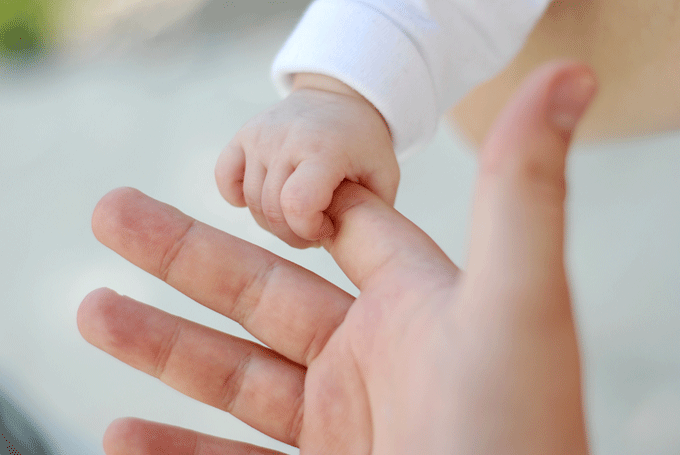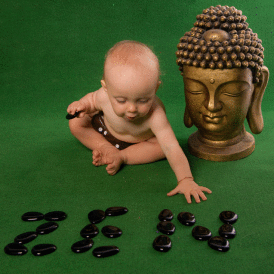During a recent dinner with several mom friends, the discussion turned to the stay-at-home vs. go-back-to-work debate. Now, this is a hot topic that many women start thinking about from the day that little plus sign appears on their pregnancy-test applicator. It’s a subject on which everyone—from mothers-in-law to politicians—seems to have a strong opinion, and those opinions can get pretty heated. When women begin judging one another, it can become downright nasty. I know a few stay-at-home moms who are righteous about their choice, as well as a couple of career-driven moms who view themselves as superior for remaining in the work force. Thank goodness, the majority of my friends fall somewhere in between, understanding that this is a decision every woman must make for herself, that there’s no one right answer and, most important, that children raised by both working moms and stay-at-home moms will most likely turn out absolutely fine.
Still, everyone has something to say on the topic. At this gathering of close friends, guards dropped and the women at the table got honest and emotional talking about the often-agonizing decision of whether to head back to a work and leave your baby in someone else’s care, or stay at home to enjoy your child but put the brakes on your career. One of the moms said she knew the moment she got engaged that she wanted to stay home to raise a family full time. (“My mom and grandma and great-grandma did it—I guess it’s in my DNA,” she said.) Another woman insisted she was destined to work until the day she died. “As much as I love my kids, I would be bored out of my fucking mind staying home,” I think was her candid proclamation.
A couple of the moms said they hadn’t been sure what they’d do until the very moment their baby was placed into their arms in the hospital. Some, like me, had a good idea. I had been raised by a stay-at-home mom, so that choice seemed right to me. But I loved my career and didn’t want to give it up either, so I opted for a compromise: freelancing part-time from home. And while that worked out pretty well—I got to be there for my kids’ important milestones while keeping one foot in the door to my career—I do sometimes get pangs of regret. I wonder where I’d be on the corporate ladder had I not stepped off it, and I suspect that those weren’t only postpartum tears I was crying, but also tears for missing the social aspects of working in an office with creative colleagues and traveling all over the world like I used to. Could I have been more fulfilled if I had gone back to work? I’ll probably never know for sure.
At the same time, those moms who’d returned to their jobs shortly after their child’s birth—including those who made good salaries and those who loved their careers—emphasized that guilt and stress and feelings of missing out on their child’s early years have often plagued them. The bottom line: There’s no easy answer, and no reason to judge someone else who’s trying to figure it out for herself.
If you’ve recently been blessed with a new family member, or are awaiting the arrival of your baby, read on and consider these important factors before making this big decision.
Can you afford to stay home? The million dollar question is whether or not your financial situation will enable you to quit your job and stay at home. Even if you have a partner who brings in a good salary, the baby brings new expenses to the household that can easily add up. Work through the numbers before you make any decisions and formulate a budget you can live with. Don’t forget to factor in first-year costs, including baby supplies, food and childcare. According to a 2010 USDA report, the average middle-income family spends about $12,000 on child-related expenses in their baby’s first year of life alone. Almost everyone I know who’s stayed at home has had to make sacrifices, whether it’s eliminating vacations or meals out. For some, quitting is just not an option after you factor in the cost of a nanny. Study the numbers before you hand in your letter of resignation.
If you go back to work, do you have a trusted caregiver? Some stay-at-home moms site the fear of leaving their kids in the hands of a stranger as the primary reason they’re staying home. Some folks are lucky because they have grandparents who are willing to pitch in. But if you opt to return to work, even part time, consider not only hiring someone, but also having a backup plan. I can’t tell you how many times a nanny has unexpectedly quit on a friend—someone I know once got her nanny’s resignation via text—or turned out to be unreliable, despite seemingly impeccable references. Do you have family in town? Does your partner have a flexible schedule, or could you trade off days to be “on call?” If your job is flexible, you may be able to rush out of the office in the middle of the day to pick up a sick child from school. But if not, you could put your job on the line. If you’re hiring a full-time nanny, consider using a childcare service in your area that can send pre-screened candidates your way, asking other parents in your neighborhood if they know a trusted caregiver who’s seeking employment, or posting a job description on the website of a local moms group you trust. But most important, when interviewing candidates, go with your gut. Have your partner screen potential nannies as well, and make sure you both feel 100 percent comfortable having this person in your home with your child.
Can you handle the day-to-day? For some moms, going back to the office feels good, especially if they love their work. But even the mothers with the best jobs and most supportive spouses talk about hectic mornings trying to get out of the house with spit-up on their suit and a crying baby they feel guilty about leaving. Not to mention having to pump breast milk in the office bathroom all day. If you stay at home, yes, you’ll enjoy your baby, but you may also suffer from bouts of loneliness or depression, especially if you’re a go-getter type who’s used to a highly social life. In retrospect, I suffered from a little bit of the second. I went from flying around the world and working in a fast-paced creative environment to sitting at home in my sweats caring for my baby. As much as I loved my daughter, in those early days I always felt slightly isolated and uneasy about my new life as a stay-at-home mom. I eventually joined a playgroup, started my own local moms group, and although it often bored me to tears going to the same little playground day after day, made an effort to befriend smart, funny women who pulled me out of my funk. And because I knew that one day I’d return to work, I tried to make the most of the time I had at home with my precious little ones. I think the main lesson here is not to give everything up at once. Even if you’re deliriously happy about staying at home, it’s wise to keep one foot in the door of your old career, have lunch with former colleagues once in a while, and stay up-to-date with industry goings-on. You never know when you’ll get the bug to go back, and keeping yourself in the loop will make it that much easier.
Can you handle the guilt? Ha, this is a trick question! You thought we were referring to the guilt you’d feel going back to work, didn’t you? Well, sister, know that we moms somehow feel guilt no matter what we decide to do, as misguided and irrational as that is. We’ll feel guilt at the office, sitting at our desks missing our baby. We might even feel guilt at home, knowing that we’re not making as much money as we used to or living up to our career aspirations. Basically we’re damned if we do, damned if we don’t—that’s one of the little quirks of motherhood you won’t read about in a pregnancy book. So the best solution is to be compassionate with yourself and know that you made the right decision at the time. And after all, nothing’s permanent: You can always go back to work, and you can always quit your job. And for some moms, the transition to motherhood inspires them to embark on an entirely new career path. Who knows what’s in store for you?
What does your heart tell you to do? This is something that no one but you can answer. The longer I’m a mom, I realize that every woman is different and has a very unique set of needs and desires. So something that makes your best friend feel fulfilled may not do it for you, and vice-versa. This is why it’s not a good idea to compare yourself to other women, or to second-guess your decision (I know, easier said than done). It’s also why we should avoid judging not only ourselves, but also other moms. Lack of support is the number one reason some women feel isolated and confused after having a baby. Remember what Hillary wrote years ago about it taking a village to raise a child? This is still so true. Nature did not intend for us to sit alone all day long in a two-bedroom condo with a baby. Infants were designed to be raised by multiple generations of women—grandmas, aunts, sisters and friends who, in those ancient glory days all took turns carrying the child around so that the new mom could continue her daily chores and still feel one with her tribe. Today, most of us don’t have anything close to that kind of support, so one could argue that we’re raising kids in the most unnatural way possible. So go easy on yourself, admit you need help when you need it, and support other women in return. The supermom myth is just that: a complete and idiotic myth.
Remember that whatever decision you make, it will be the right one for you and your family. Good luck, and please share with us the struggles and concerns you have as you embark on this journey for yourself.





















2014/05/14 at 3:25 am
Thank you for pointing out how judgmental women can be toward one another. We need to support each other instead of cutting one another down. And everybody’s decision is equally relevant. Bravo.
2014/05/14 at 3:45 am
The toughest decision i ever made was to go back to work after i had my child. but it cam down to knowing who i was and what made me tick. I knew that if i didn’t go back I wouldn’t be the same person.
2014/08/06 at 8:25 pm
Great article. Such a tough decision for all but a few women. But I agree with what Stacy said. We need to support each other on our decisions, no matter what we decide.